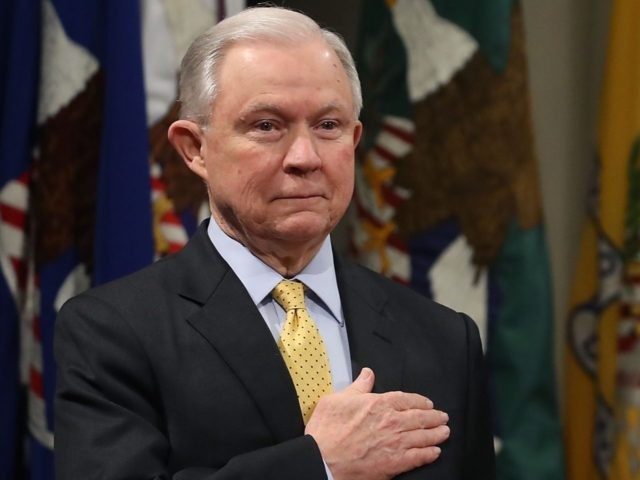Attorney General Jeff Sessions told Breitbart News in an exclusive interview on Thursday that the Department of Justice was ending the “executive branch legal activism” of the previous administration, while also fighting the judicial activism of liberal judges.
“I think the department did become too political” under President Barack Obama, Sessions said. “Essentially, it was executive branch legal activism. They would take cases or regulations or statutes and expand or redefine the meaning of words in them to advance the agenda that they thought ought to be advanced — an agenda that often had zero chance of passing Congress, where the elected representatives sit.
“So you have an agenda, and you can’t get Congress to pass it, so you use unelected regulatory officials and lawyers to draft regulations and enforcement policies that carry out a political agenda that the people don’t favor.
“And I think that was a factor in this past [presidential] election, and it was an issue that was known to a lot of business and legal experts. They saw this as a dangerous trend.”
Sessions singled out President Obama’s Deferred Action for Childhood Arrivals (DACA) program — which expires March 5 — as a primary example of “executive branch legal activism.” And he excoriated the courts for preventing President Donald Trump for withdrawing Obama’s policy.
“[President Obama] said repeatedly that it was not legal, he couldn’t do it. Congress had took up an issue and it failed to pass. So they just did it anyway.
“But now when we tried … to withdraw the DACA policy … we’ve been sued and judges have stopped simple withdrawal of the policy.”
He noted that the “biggest surprise” of his tenure as Attorney General “has been the plethora of [cases] in which a single sitting federal judge — one federal judge out of 600 some-odd — for insubstantial reasons, issues an injunction that bars the executive branch of the government from protecting people, and from being able to fulfill the function for which the chief executive was elected to fulfill.”
The executive branch, Sessions said, could not act as a “coequal” branch of government if it had to “gain approval of every one of 600 federal judges to carry out the policies [the President] was elected to do.”
There were 20 injunctions against the executive branch nationwide, Sessions said, and he expected the administration to prevail in all of them, though he faulted the media for creating the opposite expectation.
“The mainstream media creates this impression that the administration is being stopped by wonderful judges in robes of neutrality,” he said, “when in fact these are [judicial] actions that go beyond the law in many instances and will not be sustained, will be overturned.”
Sessions also commented on the various immigration bills being debated in Congress ahead of the expiration of DACA.
He supported the Grassley-Cornyn bill, which codified President Trump’s immigration policies. (The bill failed a procedural vote on Thursday, as did three other immigration bills.)
Sessions commented: “Something I’ve said for over a decade, and remains true, is that Congress seems always willing to pass any law that pretends to fix immigration as long as it does not.
“You propose legislation that will actually reverse the illegality — that seems never to pass. You draw the conclusion that there are forces out there that not only want more immigration, but they want illegal immigration to doncitnue, which is totally contrary to the will of the American people as expressed in November 2016.
“I remain firmly convinced,” he continued, “that the American people rightly and justly want an end to the illegalty, and to create an immigration system that serves the national interest. And so that is what President Trump is calling for — an end to the illegality, and a merit-based system that serves America’s interest.
“We want to bring people here who can flourish in America, who like America,” he concluded.
Despite his support for Grassley’s immigration proposals, he was somewhat critical of Grassley’s prison reform proposals, which led to a public disagreement between the two earlier this week.
“I am a great admirer of Senator Grassley, and I support his immigration bill, and I support the part of his bill on crime that deals with prison reform and enhanc[ing] our re-entry programs.”
However, he said, he was worried that reform that was too drastic could lead to a rise in crime, such as was seen in the latter years of the Obama administration.
“We don’t have small offenders in federal court … these people don’t need a slap on the wrist. These are serious crimes that require serious punishment,” he said.
Despite opposition in the courts, and political turmoil, Sessions said that the Trump administration had still achieved more than he had expected it to do when he first supported Trump for president.
“I would say that in some ways more progress has been made on the agendas that I cared about, and I think the American people cared about, than I expected, as a denizen of the Senate for 20 years, seeing proposals die right and left.
“People see a lot of negativity in the press, but few have realized just how significant and good have been the actions within the various agencies,” he argued. “A lot of it is below the radar screen. We’ve withdrawn a whole raft of improperly advised regulations — so have other agencies — most of which don’t become newsworthy for the mainstream media.”
Joel B. Pollak is Senior Editor-at-Large at Breitbart News. He was named to Forward’s 50 “most influential” Jews in 2017. He is the co-author of How Trump Won: The Inside Story of a Revolution, is available from Regnery. Follow him on Twitter at @joelpollak.

COMMENTS
Please let us know if you're having issues with commenting.